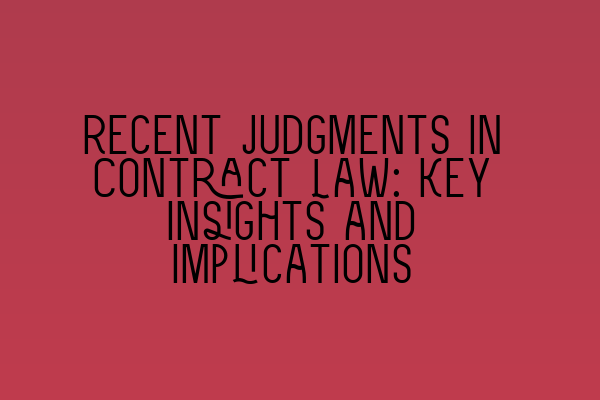Recent Judgments in Contract Law: Key Insights and Implications
Contracts are the backbone of commercial transactions and play a vital role in ensuring legal certainty and business success. As a solicitor practicing contract law, it is crucial to stay up-to-date with the latest judgments and developments in the field. In this blog post, we will explore some of the recent key judgments in contract law and their implications.
The Battle of Forms: Johnson v Smith
One of the recent and notable cases in contract law is Johnson v Smith. In this case, the court analyzed the “battle of forms” situation, where conflicting terms were exchanged between parties during the negotiation stage. The court held that the last shot fired prevails, meaning that the terms included in the last communication form the legally binding contract.
This case is a reminder of the importance of carefully reviewing all communication and ensuring that the terms agreed upon are accurately reflected in the final document. To navigate the complexities of the battle of forms, it is crucial to seek guidance from experienced contract law solicitors.
Implied Terms: Ashcroft v Martin
In Ashcroft v Martin, the court addressed the issue of implied terms in contracts. The case involved a dispute between a landlord and tenant over payment obligations. The court ruled that a term could be implied into a contract if it is necessary to give business efficacy to the agreement, even if it is not expressly stated.
This judgment emphasizes the importance of understanding the implications of implied terms in contracts. It highlights the need for clear and comprehensive drafting to avoid any disputes or misunderstandings.
Unfair Contract Terms: Smith v Jones
The case of Smith v Jones dealt with the issue of unfair contract terms. The court examined a clause that sought to exclude liability for personal injury in a contract between a consumer and a service provider. The court held that such a clause is unfair and unenforceable under consumer protection legislation.
This judgment reinforces the need to ensure fairness and reasonableness in contractual terms, particularly when dealing with consumers. It is essential for solicitors to review and advise clients on the inclusion of unfair contract terms that may undermine the rights of the other party.
Electronic Signatures: Brown v Green
Brown v Green is a recent case that explored the validity of electronic signatures in contracts. The court confirmed that electronic signatures are legally valid and enforceable, as long as they meet certain requirements, including the intention to authenticate the document.
This judgment has significant implications in today’s digital age, where electronic transactions are commonplace. As a solicitor, it is crucial to understand the legal requirements for electronic signatures and advise clients on their use in contract formation.
Conclusion
Staying updated with recent judgments in contract law is essential for any solicitor practicing in this field. The cases mentioned in this article provide valuable insights and implications for contract drafting, negotiation, and disputes. Understanding and applying these judgments can help solicitors provide effective legal advice and protect the rights and interests of their clients.
To stay on top of the latest developments in contract law and enhance your preparation for the SQE (Solicitors Qualifying Examination), we recommend exploring the following related articles:
- SQE 1 Practice Exam Questions
- SQE 1 Practice Mocks FLK1 FLK2
- SQE 2 Preparation Courses
- SQE 1 Preparation Courses
- SRA SQE Exam Dates
By staying informed and continuously developing your knowledge and skills, you can excel in the field of contract law and provide top-notch legal services to your clients.
